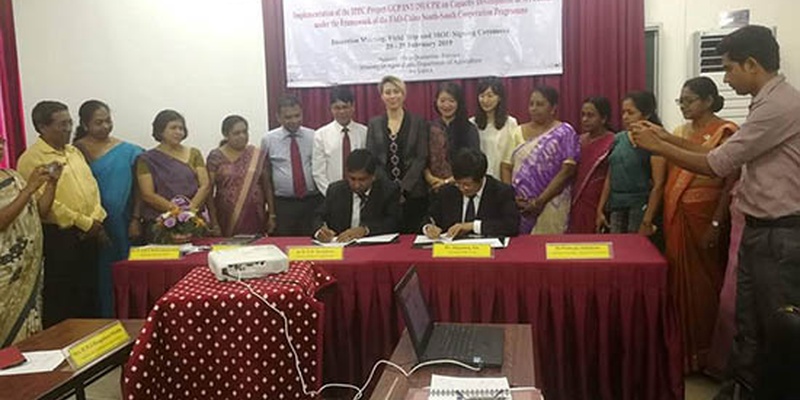A New Memorandum of Understanding with the IPPC Secretariat will help Sri Lanka Boost its Phytosanitary Capacity
Posted on Lun, 11 Mar 2019, 11:22

A historical moment: signing the Memorandum of Understanding (MoU) between the IPPC Secretariat and the Sri Lankan NPPO. Through the MoU, Sri Lanka will become a pilot country for the IPPC-China South South Cooperation Project. © IPPC Secretariat.
25 February 2019, Colombo, Sri Lanka - Through its One Belt, One Road initiative, China aims to reactivate the ancient silk trade routes. This effort to promote trade and build infrastructure across maritime and terrestrial pathways has phytosanitary consequences. To prevent the introduction and spread of pests along these pathways, China is investing resources to strengthen collaboration and build the phytosanitary capacities of the countries involved.
The IPPC Secretariat manages a USD 2 million project entitled Strengthening the Capacity of Developing Contracting Parties to Implement the IPPC and its standards under FAO-China South-South Cooperation (SSC) programme (GCP /INT/291/CPR). The project aims to develop phytosanitary capacity in some One Belt, One Road countries. The project also sets up pilot sites for demonstrating new technologies and products related to plant health. Sri Lanka was selected as one of the two pilot countries for the project.
From 25 to 28 February 2019, a team from the IPPC Secretariat visited Sri Lanka to discuss and reach agreement on the implementation of a pilot site in this country to demonstrate new plant health technologies and products. The delegation, composed of Mr Jingyuan Xia, IPPC Secretary, Ms Sarah Brunel, Implementation Facilitation Officer, Ms Xiaonan Li, IPPC Phytosanitary Consultant, as well as Ms Zhihong Li, Professor from China Agricultural University, met with the Sri Lankan authorities and the FAO office representative. They also visited Anuradhapura, in the North-central province of the country, to meet with five mango and guava producers. Together they discussed how to set up experiments and farmer field schools for monitoring and managing the most important pests of these crops.
The mission ended with the official signing of a Memorandum of Understanding (MoU) between the Department of Agriculture of Sri Lanka and FAO on behalf of the IPPC Secretariat. Several Sri Lankan NPPO representatives, including W.W.W. Weerakoon, Director General of Agriculture, W. A. Raveen Thushara Wickramarachchi, Additional Director, and Champika Hewage, Principal Scientist, were present for the signing with the IPPC Secretary. Following the signing of the MoU, the project steering committee set a clear work plan for 2019-2021 including the following activities:
-
conducting an IPPC Phytosanitary Capacity Evaluation (PCE) to guide the NPPO in developing a national phytosanitary capacity development strategy and help in the revision of their phytosanitary legislation;
-
delivering training courses on phytosanitary technologies related to heat and irradiation treatments; and
-
organizing field demonstrations of the Chinese Plant health Technologies in several pilot sites to control fruit flies.
Through this pilot project, Sri Lanka will improve its NPPO and benefit from new technologies and training that will allow it to more safely and efficiently export its tropical fruits. Sri Lankan authorities and producers, the IPPC Secretariat and the Chinese counterpart were satisfied that this would be the start of a very fruitful collaboration.

Sharing a moment of conviviality at a farmer s house to define how to set up the pilot sites in Sri Lanka. © IPPC Secretariat

